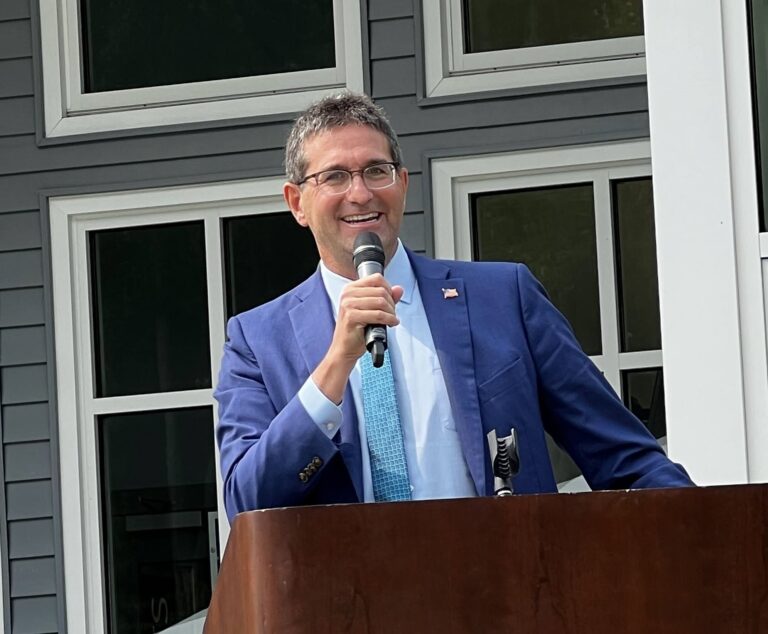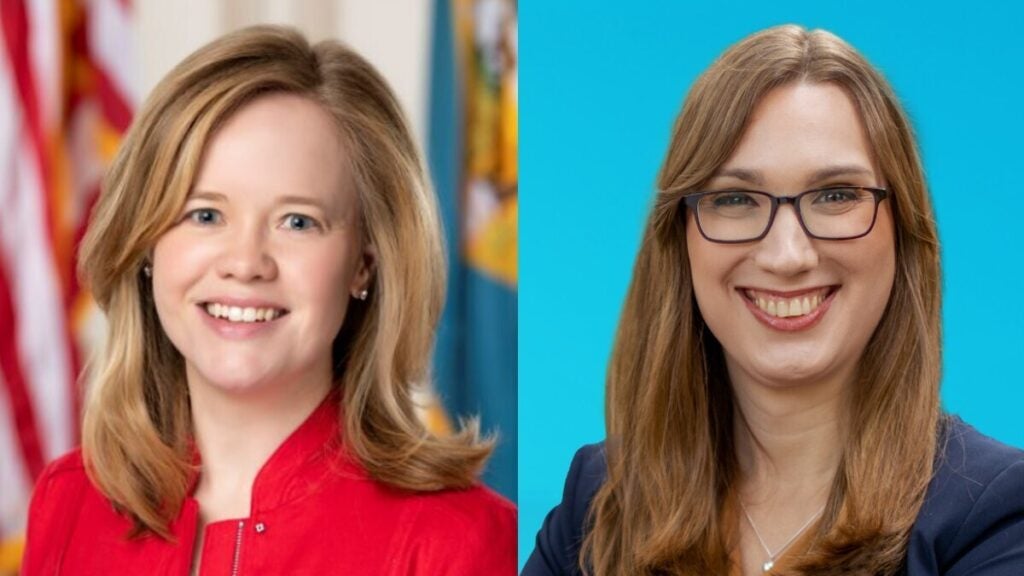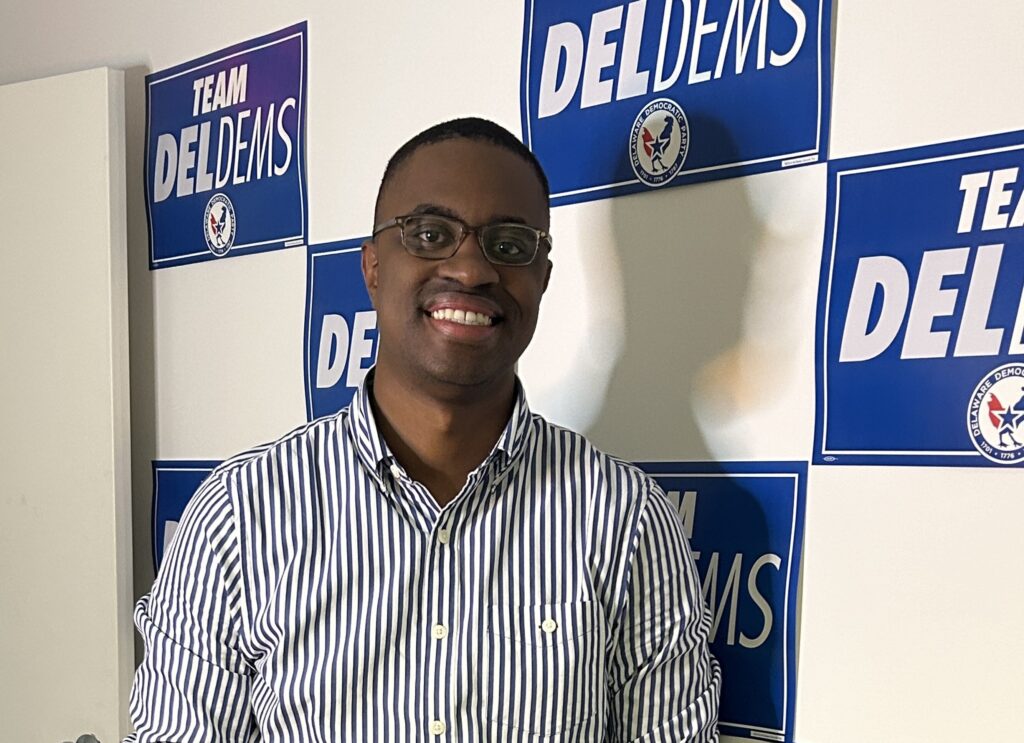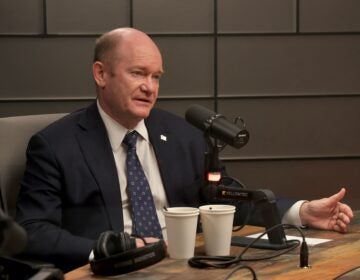‘Crazy insider game’: Gov.-elect Meyer wants Delaware Democrats to hold primaries — not anoint nominees — for vacant Senate seats
The offices are opening up in January because Sen. Sarah McBride is going to Congress, and Sen. Kyle Evans Gay will become lieutenant governor.
Listen 1:56
Democrat Matt Meyer was elected to become the next governor of Delaware. (Courtesy of Matt Meyer)
From Philly and the Pa. suburbs to South Jersey and Delaware, what would you like WHYY News to cover? Let us know!
Matt Meyer bucked the Delaware Democratic establishment by running for governor, and then handily defeated the party’s handpicked choice of Lt. Gov. Bethany Hall-Long in September’s primary.
The party had no choice but to endorse two-term New Castle County Executive Meyer in last week’s general election, but moments after voters handed him a decisive victory, Meyer took pains to highlight the previous snub.
“Ours was a campaign that under the old ‘Delaware Way’ was given little chance of success,’’ Meyer told WHYY News. “Let’s be honest. Insiders chose their candidate and were celebrating their path to more of the same, and we thought something different.”
And now, more than two months before he takes office Jan. 21, the triumphant Meyer is taking on his party again over another upcoming election.
He’s calling on Democrats to refrain from their usual practice of anointing candidates for two soon-to-be-open seats in the state Senate. Instead, he wants them to hold a primary election so voters can select the nominee.
The seats will be vacated in January by two party favorites who won higher office — Sarah McBride, who will become Delaware’s lone member of the U.S. House of Representatives, and Kyle Evans Gay, who will be lieutenant governor.

Meyer says he’s not seeking to engage in a battle of wills with the Democratic leaders who didn’t want him as governor. But now that he’s the unofficial boss of Delaware Democrats, Meyer said his proposal to change how special elections are handled is an example — one of many more to come — of his quest for greater transparency and inclusiveness in government and politics.
“The insiders should not be selecting who represents people in the state Senate. I think the people should decide. It’s as simple as that,’’ Meyer told WHYY News. “We have party committees that are not really elected by the Democratic members. Usually, it’s party insiders and it’s a crazy insider game of who you know. It’s more of a selection instead of an election.”
“My job as governor is to serve the residents of the state. And if it comes to disagreement with the party leadership, or certain powerful people, so be it.”
Meyer outlined his position in a letter he sent to Democratic Party chair Betsy Maron on Friday, three days after being elected.
Maron did not return a request from WHYY News to discuss Meyer’s proposition. But Monday she rejected the proposal in a letter to the governor-elect that also said changes could be considered at the party’s annual convention in June.
“We welcome a dialogue to evaluate the current official replacement process under the Delaware Code, the Delaware Democratic Party rules, and the laws of other subdivisions and municipalities,’’ Maron wrote. “At this time, however, we cannot support your proposal.”
Maron’s letter noted that Delaware law “empowers’’ but doesn’t require the party to name its nominee for a special election. She also wrote that another possible barrier is that state law doesn’t spell out how the Department of Elections would run a primary in a special election.
The law says that within 10 days of a vacancy in the General Assembly, the chamber’s presiding officer should call a special election. The election must occur 30 to 35 days later.
Even though the law doesn’t prohibit primaries in special elections, Travis Williams, the party’s executive director, told WHYY News he believes the statute would need to be revised before the party could institute the process Meyer wants.
“It really is the matter of the state code at this point,’’ Williams said, though he acknowledged the law “doesn’t really go into prescribing how that nomination comes to be.”

Williams said several dozen people on governing committees in each Senate district would interview candidates before deciding. “What we do use is a relatively transparent process. It’s not a secret,” he said.
Julianne Murray, state Republican chair and a lawyer, said she hadn’t previously considered the issue, but called it worthy of discussion. Murray said that even though the law doesn’t require political parties to select candidates, that’s been the tradition in Delaware.
She said that even if Democrats decided to heed Meyer’s call, the more difficult problem would be the logistics of holding both a primary and a general election within the 45-day timetable.
“It’s a pretty tight window,” Murray said.
Party leaders seek ‘deliberation and swift candidate selection’
Democratic leaders have long anticipated that McBride and Gay would ascend to the higher offices in a state where Democrats have held all nine statewide elected offices since 2018.
So on Oct. 24 — 12 days before the Nov. 5 general election — party leaders sent out a timeline and outlined its process to select nominees to replace them. The memo to election district chairs, committee members and Senate leaders said advance notice was disseminated “to allow for thoughtful deliberation and swift candidate selection.”
The memo gave potential candidates until this week to fill out a form requesting that they be nominated, with Zoom meetings to interview them set for next week. On Dec. 9, the respective Senate district committees would select the nominees.
Meyer’s way, however, would remove the party’s leadership from the decision.
He’d give local leaders and statewide bosses such as Maron and Williams the next month to meet and amend party rules to authorize the primary.
Under Meyer’s vision for this special election, the primary would be held Tuesday, Jan. 7 — four days after McBride gets sworn in as the first transgender member of Congress. Gay would not take office as lieutenant governor until Jan. 21, the same day Meyer takes the oath of office for governor.
Meyer would set the general election for Feb. 11, well within the deadline that’s stipulated in state law for open seats.
“The upcoming special elections provide our party an opportunity and an obligation to ensure our candidate selection process honors our platform and values,’’ Meyer wrote.
Meyer added that such an “open and inclusive process would require our candidates to organize, persuade, and get out the vote in order to earn the Democratic nomination, providing them with a strong mandate from Democratic voters and setting us up to succeed in the special elections.”
‘To change the rules midstream seems fundamentally unfair’
Maron wasn’t swayed.
“To change the rules midstream seems fundamentally unfair and contrary to a democratic process,’’ Maron wrote. “We want the eventual nominees to be well positioned to organize, fundraise, persuade, and get out the vote for the special elections. The lengthier time from December through February will assist in that goal.
“Moreover, we do not want to concede the entire month of December to the GOP candidate who has been selected in the proverbial ‘smoke-filled rooms’ and will have the advantage of time to build a campaign.”
The GOP’s Murray scoffed at the idea that Republicans huddle behind closed doors to pick a candidate.
“Both parties do it exactly the same,’’ Murray said. “That’s hilarious.”
Maron also noted that if Meyer wanted the party to hold a primary election instead of the state, they would need to determine several matters, such as:
- Costs and who bears them
- Filing deadlines and filing fees for candidates
- Campaign finance requirements
- Use and cost of public and private facilities for the election
- Selection and preparation of polling places
- Balloting process, including voting machine rentals or paper/electronic ballots
- Hiring workers for the polling stations
- Absentee and early voting procedures
Before he received that letter, Meyer rejected the notion that his proposal was unworkable. He cited the Hope Center for people experiencing homelessness that his county administration created near New Castle in 2020, early in the coronavirus pandemic, at a former Sheraton hotel.
“This is Delaware. It’s a small place. We went from having a hotel at the corner of Route 141 and I-95 to the largest emergency shelter for vulnerable people in about 60 days,’’ Meyer said.
“And if we can do that, in the middle of COVID, we can figure out how to have special primary elections that include all the people of the Senate district, not just insiders choosing who the candidate is.”
After receiving Maron’s response, Meyer was undeterred.
“Our administration is committed to fighting for transparency everywhere it’s needed, including within our own party’s rules,’’ he said. “The party’s refusal to adopt common sense changes is not a rejection of our guidance but rather a lack of will and desire for status quo. Change is coming.”
Williams said the party is not opposing Meyer but rather seeking to approach the issue deliberately. Should state lawmakers want to change the law, he said the party would work with them on the issue.
“I don’t think that we are at odds with the governor-elect,” Williams said. “We’re having a dialogue and we’re working together to make sure that we’re doing right by the people of Delaware.”
Murray said the bigger picture is that Meyer’s salvo signals that he’s going to be an “activist” governor who won’t be constrained by the traditional norms of Delaware politics.
“Matt Meyer is going to exert his influence in lots of ways in Delaware,” Murray said. “And this just is going completely with where I figured he was going to be going, and sort of telegraphing the vision that he has for where Delaware needs to go.”

Get daily updates from WHYY News!
WHYY is your source for fact-based, in-depth journalism and information. As a nonprofit organization, we rely on financial support from readers like you. Please give today.







